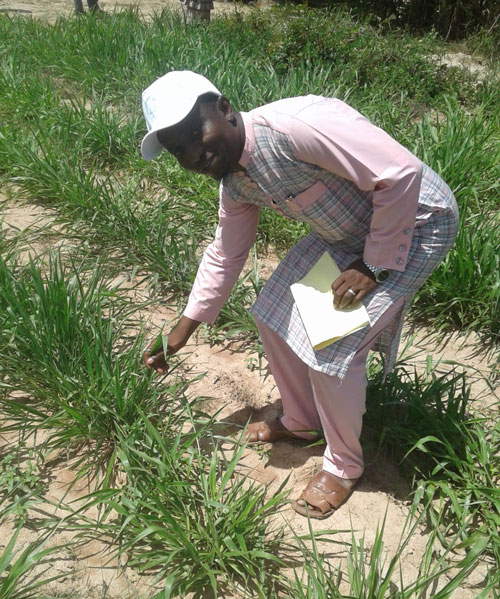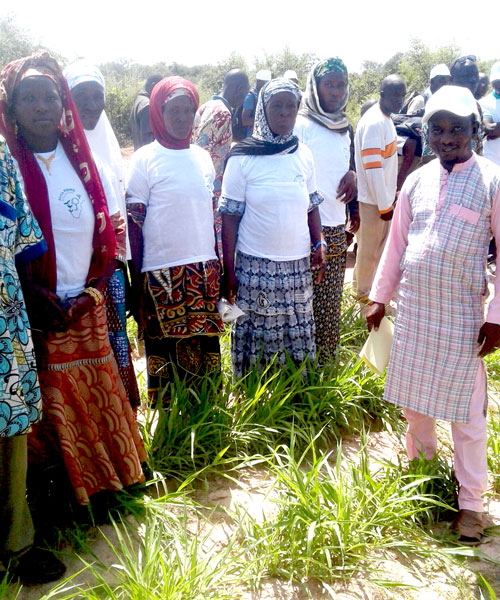Daar es Salam, Tanzania – There is more than meets the eye around plants' roots, in that narrow region of soil called rhyzosphere that is influenced by root secretions and microorganisms. Here bacteria of all kinds thrive and communicate with plants and with members of their community. Some bacteria fix useful elements such as nitrogen; some dissolve phosphorous, essential for growth. Others sense danger and, by activating inner plant defences, they become natural biopesticides.
Identification of their potential effects is increasingly tuning into a useful tool for Malian farmers, who are learning how to enrich their fields in natural ways using good bacteria, and how to protect crops from devastating infections with a reduced use of chemical compounds.
"Some soil bacteria are very helpful: they act as sentries," explained agronomist Amadou Dicko from Mali. "Upon perceiving the danger posed by ill-causing bacteria (pathogens), they produce hormones that sound as an alarm. This triggers a quick response: plants react by releasing smelly chemicals that kill dangerous microbes, or keep them at a distance."
Dicko was one of about 30 African scientists at a recent TWAS Research Grants conference in Tanzania from 28-31 August, organised with funding from the Swedish International Development Cooperation Agency (Sida) and local support from the Tanzania Academy of Sciences. For scientists in the audience, it was an opportunity to sharpen their skills in drafting effective scientific proposals and protecting intellectual property. It was also an opportunity to build their networks across a continent where science is essential for sustainable development and solving challenges.
Dicko is an agronomer based in Mali's capital city of Bamako. He holds a PhD in microbial biotechnology from the University of Sciences and Technologies, where he currently works as an assistant professor in the faculty of agronomy and animal sciences. He is also the recipient of a 2017-2019 TWAS grant, which is proving instrumental in boosting his scientific career.
"With this grant, I could buy the fermentor I needed to grow bacteria, which are the core of my work," he explained. Dicko does research in microbiology: he investigates soil components and plant diseases, tests fertilization strategies, and studies how some bacteria may stimulate plants' self-defence, or improve crops' quality without using chemical products. Ultimately, his research might have an important impact on food security, which is a crucial issue in Mali especially when it comes to potatoes and rice.
Using nature to protect crops
In Africa, as Dicko explained, potatoes are an important source of food. However, they are susceptible to various diseases, such as soft rot caused by bacteria like Bacillus pumilus. Malian farmers lose more than 30% of their stored potato production because of soft rot: by releasing specific enzymes, in fact, these bacteria turn the tuber into a mush that they feed on. Microbial control is difficult, because strategies based on conservation practices and chemicals normally are not effective, and the microbe survives for years as spores in soil.
This is where Dicko's research comes in. He studies so-called endophytic bacteria that act as plant growth-promoting or pathogen-suppressing agents, helping the plant to enhance its resistance to various kinds of stress.
"We found that bacteria like Actinomycetes, isolated from soil rhizosphere around healthy Malian indigenous trees, can supppress the growth of Bacillus strains in lab tests," said Dicko. "Should we succeed in scaling up this strategy, these bacteria could be a promising alternative to chemical products, able to alleviate African smallholders' poverty. Synthetic chemicals that are used to control plant diseases not only pollute the environment – they are dangerous to human health, and they cost a lot."
Rice is another important food source for Africa, and Mali in particular. The soil is often very poor, and two rice diseases – bacterial leaf blight and rice yellow mottle virus disease – often cause a dramatic decrease in rice yields. That translates to economic losses and lack of food security.
To counter these threats, Malian farmers tend to use high amount of chemicals that also kill beneficial bacteria. In Dicko's experience, the use of endophytic bacteria for disease management could make the difference.
"In my lab, we have isolated a collection of microbes extremely good in triggering plants' growth and self-defence," he explained. "Our database contains today more than 100 bacterial strains, many of which are under investigation by means of molecular analysis."
"They cannot believe their eyes"
The main result expected from this is the production of effective low-cost biopesticides. This is part of a strategy for long-term sustainable rice pathogen biocontrol, which will be tested by smallholder rice farmers in Africa, along with another strategy aimed at enhancing crop yields by means of fungi injections.
"I provide farmers with bacteria against pathogens, and ask them to observe the effect of inocula on their crops," Dicko said. "They cannot believe their eyes. In case of poor and unproductive fields, I make vesicular-arbuscular mycorrhizal fungi (VAMF) inocula around the roots, to help the plant grow better." When fungi associate with plants' roots, they sprout mycorhizae: tiny extensions that force the roots to grow deeper in the soil, where they can absorb more nutrients and water.
"By transferring patches of mycorhizae to unproductive soil, I restore its vegetative potential. In the beginning they don't believe this is possible. After they see the results, they ask me more. Much of my work is in fields, now," he said.
In the near future, Dicko hopes to establish new research partnerships in areas such as soil-plant-microbe interactions, and fertility and plant protection. Chances to build productive cooperations are high: at the TWAS Research Grants conference in Dar es Salaam, seven African colleagues – from Madagascar, Kenya, Togo, Senegal and Sudan – expressed an interest in working with him.
Another project he is working on is the possibility that bacteria could be used to extract phosphate from rocks. Synthetic phosphate used as fertilizer is expensive, but Mali has quantities of Tilemsi phosphate rock, which is rich in phosphorous (a slightly different chemical form of phosphate). Phosphorous is an essential nutrient for plants, supporting growth, photosynthesis, respiration and energy storage.
"If this works, we may think of patenting our idea," he said. "Now we are at a very early stage, but what I have learned at the TWAS conference in Tanzania will certainly be useful soon."
Cristina Serra

